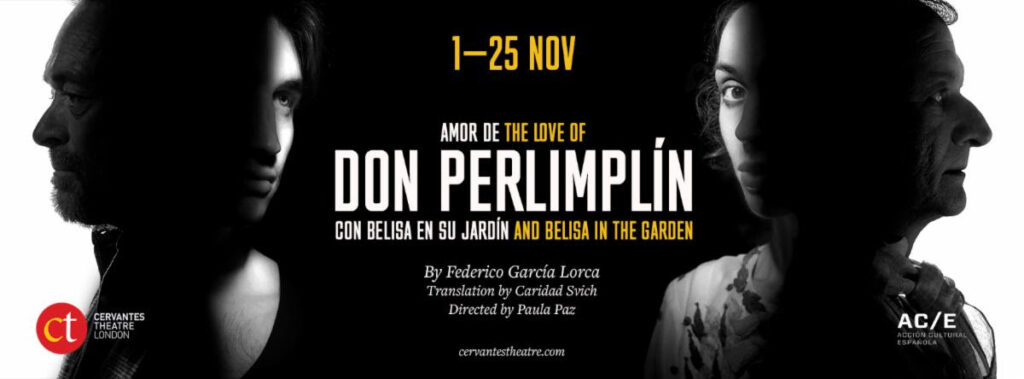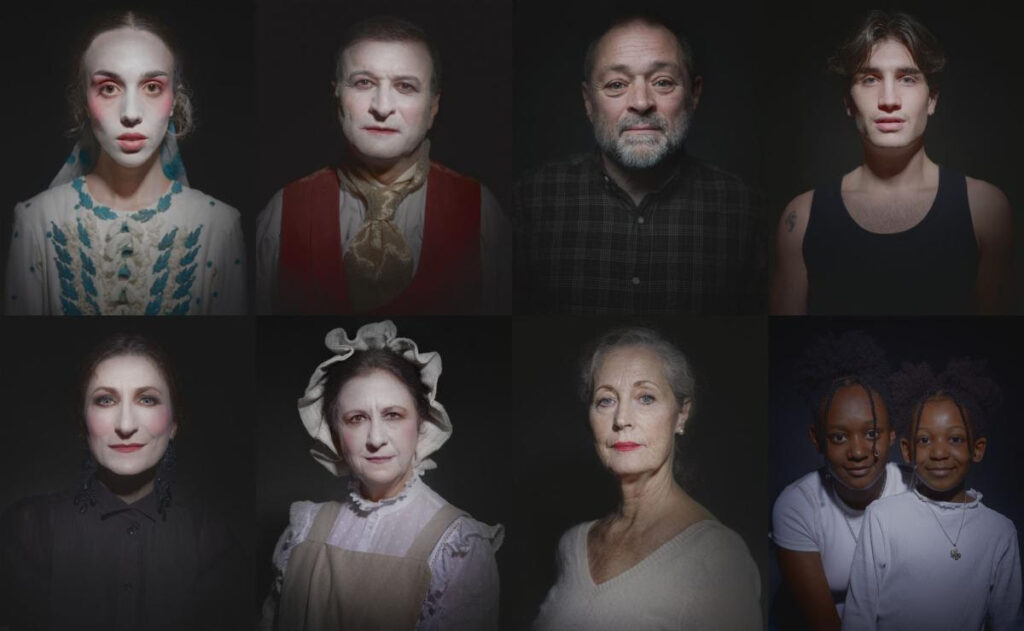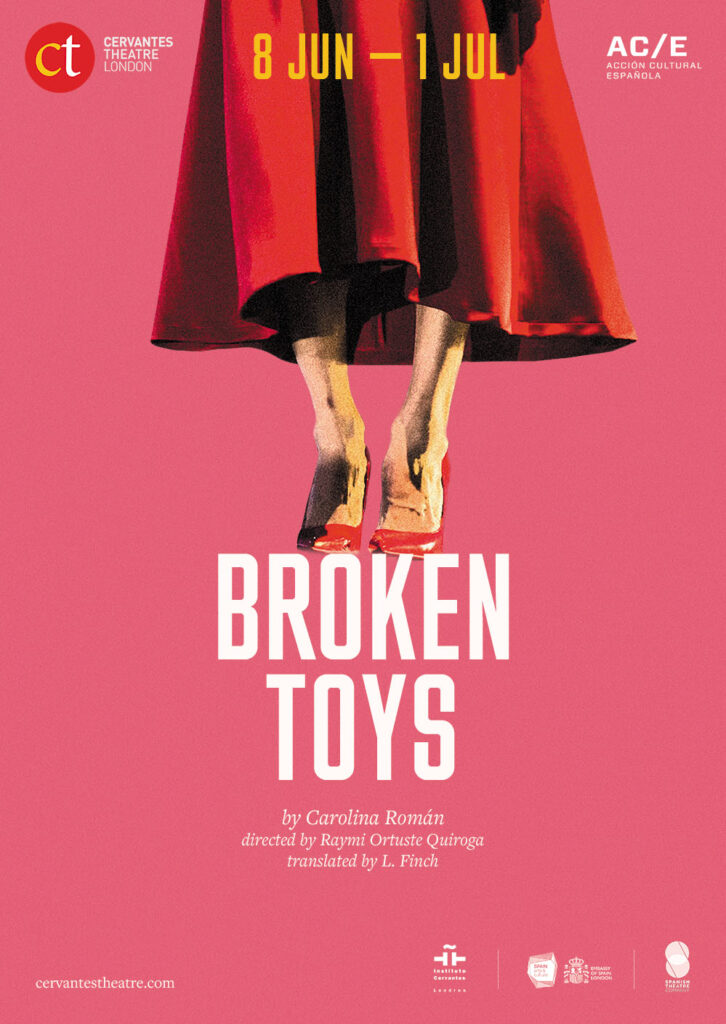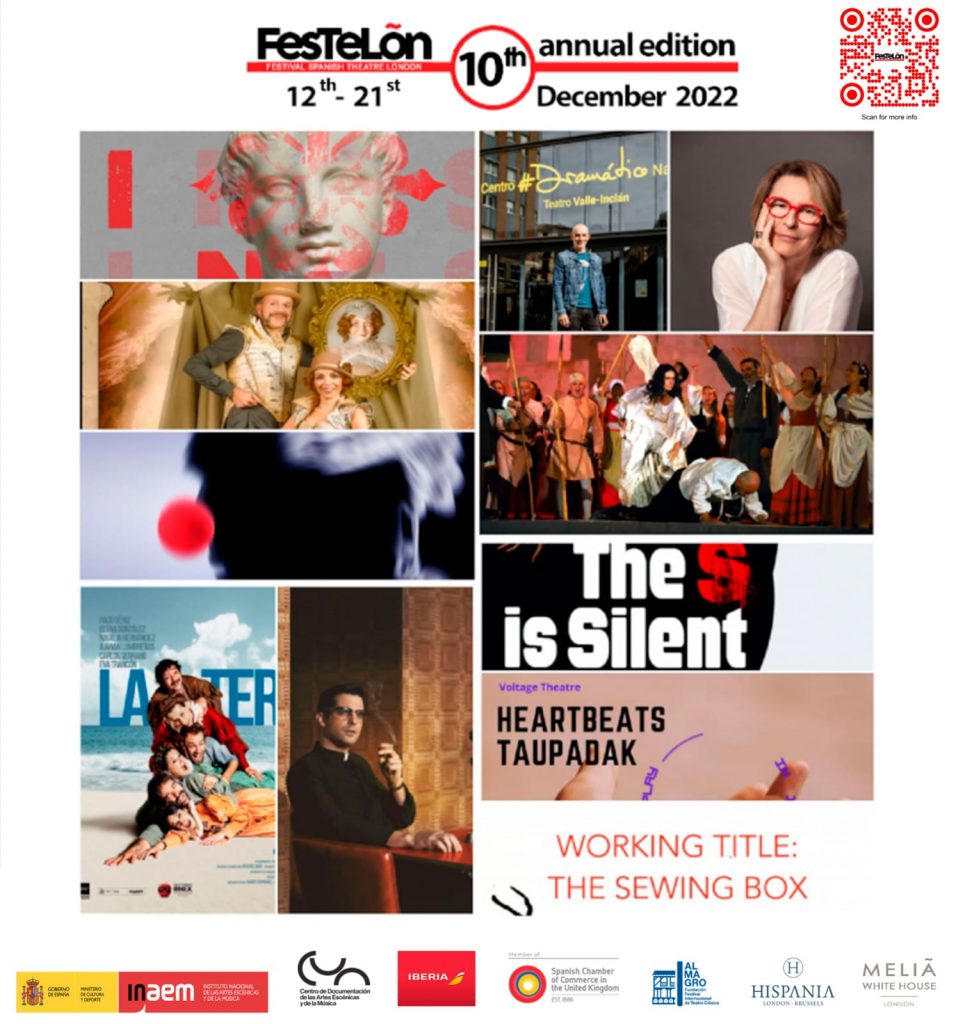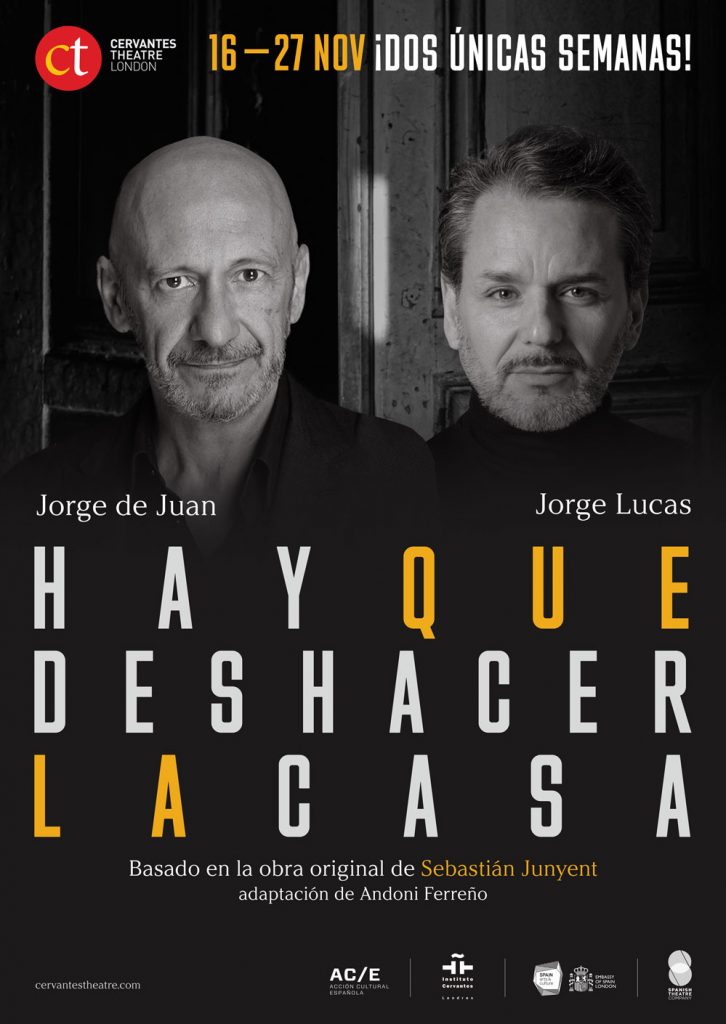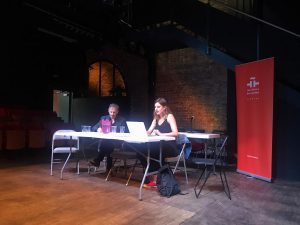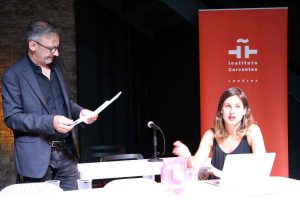The Love of Don Perlimplín and Belisa in the Garden
This Wednesday 1st of November is opening night for The Love of Don Perlimplín and Belisa in the Garden, one of the most poetic plays by Federico García Lorca.
A gem of Spanish theatre repertoire that can be seen in both English and Spanish every night in a new and surprising production directed by the Cervantes Theatre Artistic Director Paula Paz.
From 1st until 25th November, for four weeks only, first act in Spanish with English surtitles and second act in English. You can’t miss this production!
Did you know that Don Perlimplín was first performed in the UK in 1945 right after World War II being one of the first Lorca texts to be performed outside of Spain? It was seen as a success, running for roughly 4 years but it also scandalised the bourgeois audience and was authorised but heavily censored.
Joan Littlewood said in 1945 «Lorca’s plays deal with the terrible barrier between the sexes which existed in his country and is perhaps not unknown here. … Surely the first impact of any work of art is disturbing and even destructive: we must risk this ‘unpleasantness’ if our culture is not to atrophy.»
*Research by Professor María Bastianes
Paula Paz releases this potential in Cervantes Theatre’s production of Don Perlimplín which sees the text unleashed whilst sticking true to Lorca’s vision.
Broken Toys opens this week!
| Coinciding with PRIDE month and at a time when Drag Artists face bans, Trans rights are under attack and hate crimes against LGBTQIA+ people are on the rise, this story documents the struggles of the past, memorialises queer love and celebrates the resilience of collective joy and profound self-expression. Don’t miss the UK première of Broken Toys, an award winning play by Spanish playwright Carolina Román, directed by Raymi Ortuste and translated by L. Finch. Join Cervantes Theatre this Thursday 8th June at 7:30pm for the opening night and post show Q&A with Carolina Román, Raymi Ortuste and the cast. 8th June- 1st July Thurs-Sat Broken Toys (in English) From her childhood days during the Franco regime, playing in the dovecote of her family home, Marion dreams of a life without shame – despite being assigned the word “male” at birth. In the underground sanctuaries of a hiding but thriving queer community, Marion begins to move out of the cages that have kept her true self confined. With the love of a bruised but bright Drag star, Dorín Delacroix, Marion takes us into a place of light, memory, pain, communion, and celebration. At a time when Drag Artists face bans, Trans rights are under attack and hate crimes against LGBTQIA+ people are on the rise, this story documents the struggles of the past, memorialises queer love and celebrates the resilience of collective joy and profound self-expression. In an act of defiance and radical self-expression, these bodies will inhabit the centre with pride. And send a love letter to all in the LGBTQIA+ community who have been and are still persecuted for choosing to fly… |
The 10th edition of FesTeLõn is back
We are delighted to announce that the 10th edition of FesTeLõn will be taking place from 12 – 21st December. FesTeLõn has a great variety of events planned: from plays to theatre screenings, masterclasses, talks and workshops, there’s something for everyone!
In addition, the second edition of FesTeLOFF will be taking place on Sunday 18th December – it is not to be missed!
FesTeLõn full programme of events and tickets can both be accessed on their website. Make sure you get your tickets before they go!
‘Hay que deshacer la casa’, la obra con la que el Cervantes Theatre celebra su quinto aniversario
El Cervantes Theatre de Londres celebra su quinto aniversario con la obra ‘Hay que deshacer la casa’, basadoaen la obra original de Sebastián Junyent, adaptación de Andoni Ferreño.
Dos hermanos –Álvaro y Cosme- separados por la distancia los enfrentamientos tienen que verse, inevitablemente, cara a cara. Uno abandonó la casa familiar para instalarse en París. Los padres quedaron al cuidado del otro, en una pequeña ciudad de provincias. El inevitable reencuentro se produce tras el fallecimiento de los padres. Deben repartirse la herencia en el domicilio familiar. Con cada objeto surge un recuerdo, con cada lote un reproche o una justificación.
El deseo de terminar rápidamente con el tenso reencuentro les lleva a iniciar una disparatada partida de cartas, jugándose con ella los lotes. La casa queda levantada, pero la relación fraternal no vuelve a ser la misma tras la catarsis, a ratos divertida, a ratos dramática y siempre emocionante
The Cervantes Theatre celebrates its fifth anniversary with the play ‘Hay que deshacer la casa’, based in the original play by Sebastián Junyent, with an adaptation byAndoni Ferreño.
Two brothers – Alvaro and Cosme, estranged from each other by distance and conflict, unavoidably have to meet face to face. One brother left the family home to go to live in Paris. The other brother was left to care for their parents in a small regional city. The inevitable reencounter takes place after the parents’ death.
They must divide the inheritance at the family home. Every object brings about a memory, every share a rebuke or a vindication.
Their desire to finish this tense reunion quickly makes them start a foolish game of cards with the inheritance as a prize. The house gets sorted but the fraternal relationship will not be the same. This cathartic interaction is sometimes funny, sometimes dramatic but above all touching.
Tickets: Cervantes Theatre
El Cervantes Theatre apuesta un año más por la internacionalización de los autores teatrales españoles contemporáneos

Un momento de cambio.
Con el objetivo de mostrar a los autores teatrales españoles más novedosos y de mayor éxito en Londres y en un momento de cambio sin precedentes, el Cervantes Theatre de Londres tiene el placer de anunciar la Temporada de Otoño 2020 gracias al apoyo de Acción Cultural Española y la colaboración del Instituto Cervantes, el INAEM (Instituto de las Artes Escénicas y la Música) del Ministerio de Cultura y Deporte y la Embajada de España en Londres.
Esta temporada especial presenta 10 lecturas dramatizadas en línea, traducidas al inglés, de algunos de los mejores dramaturgos españoles; tras la emisión de los vídeos habrá un coloquio con los autores, traductores y equipo creativo.
Tras el excelente resultado de audiencias y crítica obtenido en el periodo 2017-2019, Acción Cultural Española y el Cervantes Theatre han decidido dar continuidad a su colaboración con un nuevo formato para llegar al público en estos tiempos en los que, debido a la crisis sanitaria ocasionada por la COVID-19, la cultura ha visto muy limitada su actividad presencial. La nueva propuesta pretende aprovechar las nuevas tecnologías y tratar de llevar los textos de autores españoles a los ordenadores, tablets, y teléfonos de los espectadores de cualquier lugar del mundo, en inglés, permitiendo así acceder también a las aulas de los estudiantes de cualquier colegio y universidad interesado en la dramaturgia española.
«El apoyo continuo de AC/E y del gobierno de España ha sido y es fundamental para la supervivencia de nuestro teatro y en esta crisis mundial en la que estamos inmersos, más todavía. Pensé que tendríamos que cerrarlo para siempre pero, tras una reunión con el presidente de AC/E y su equipo de dirección, me transmitieron que estaban dispuestos a que esto no ocurriera y nunca tendré palabras suficientes para agradecérselo.» comenta Jorge de Juan, fundador y Director Artístico del Cervantes Theatre.
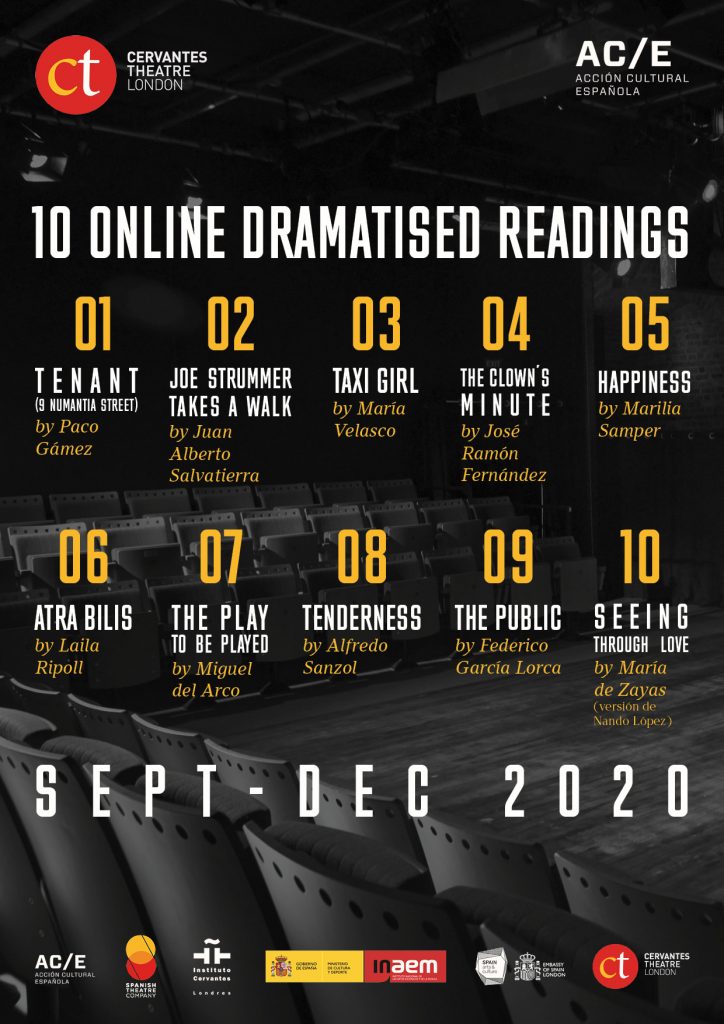
Este nuevo formato incorporará los ciclos ya consolidados:
IV Ciclo de NuevaDramaturgiaEspañola
III Ciclo de Teatro Español Contemporáneo
II Ciclo Aproximación al Teatro delSiglo de Oro español
y añadirá uno nuevo, el I Ciclo Aprendiendo de Nuestros Maestros.
“Necesitamos historias para aprender del pasado, entender el presente y construir el futuro. Este es un punto de inflexión en la historia y la cultura nos mantiene anclados cuando todo a nuestro alrededor se mueve, ilumina lo que tiene que ser visto y enciende la chispa de la imaginación para construir nuevos caminos. Queremos capturar abrir un espacio digital en el que podamos celebrar de nuevo la diversidad de culturas, idiomas e historias. El teatro une y queremos estar cerca de todos vosotros” añade Paula Paz, cofundadora y Directora Asociada del Cervantes Theatre.
LOS AUTORES OPINAN:
Juan Alberto Salvatierra
«Cuando escribí «El paseo de Joe Strummer» pensé que estaría de alguna manera incompleta hasta que esta no estuviese traducida al inglés. Que el Cervantes Theatre junto a AC/E hayan propiciado su traducción y lectura dramatizada significa para mí la conclusión de un proceso de creación”.
María Velasco
«Las traducciones hacen posible la migración de palabras y acciones. Tienen algo de equipaje delicado y de narcotráfico, como todo lo transfronterizo. Gracias, Teatro Cervantes, por hacer posible una de las pocas fugas que nos quedan. Gracias por hacernos viajar sin visado. La cultura activa siempre lucha contra las constricciones del espacio y del tiempo.»
José Ramón Fernández
«Soy fan del Cervantes Theatre desde que era un sueño en las cabezas de varios locos… Por eso me hace muy feliz saber que «El minuto del payaso» va a respirar en ese lugar, que es muy especial porque es un teatro y además un puente. En días como estos, es un modo de decirle a Londres “I can’t stop loving you”.»
Alfredo Sanzol
«Hoy en día hay mucha gente pensando en largarse a una isla solitaria. «La Ternura» también habla de eso, de las fantasías de soledad para huir de los problemas. Todo lo he contado imitando a las comedias del s.XVI y XVII las españolas, y las inglesas, así que espero que vaya muy bien en Londres. «
Miguel del Arco
«La función por hacer» marca un antes y después en mi carrera profesional. El año pasado celebramos el 10º aniversario de su estreno y volvimos a representarla en el teatro Pavón Kamikaze con el reparto original, pero a lo largo de estos 10 años no ha parado de representarse tanto en reposiciones varias, en Madrid, como en giras nacionales e internacionales. Así que la perspectiva de que se traduzca al ingles y se presente en el Cervantes Theatre de Londres, de la mano de Jorge de Juan, es una alegría enorme y una guinda más en este sabroso pastel que llevamos 10 años saboreando.»
Nando López
«Personalmente, iniciativas como esta me parecen doblemente valientes, ya que permiten acercar al público de hablan inglesa tanto las voces más relevantes de nuestra literatura clásica como la mirada singular que, sobre ella, intentamos aportar desde la dramaturgia contemporánea. «
Laila Ripoll.
«La traducción al inglés y difusión por medio de las lecturas en el Cervantes Theatre de mi obra supone un balón de oxígeno, un estímulo para seguir creando. Son muy pocas las oportunidades que tenemos los autores de dar a conocer nuestra obra fuera y si, además, es en un lugar tan importante y tan emblemático para el teatro, esas oportunidades se reducen.»
Paco Gámez.
«Estudié filología inglesa por amor a la literatura inglesa. Mi escritura bebe del teatro britanico (in-yer-face, Shakespeare…). Leer mis palabras en este idioma es una alegría y que el texto esté vinculado al Cervantes Theatre es un honor por la labor de difusión que están haciendo de la nueva dramaturgia española.»
Marilia Samper
Que “La alegría” sea leída en el Cervantes Theatre me llena de felicidad, no sólo por poder escuchar mis palabras en inglés y la posibilidad de que mi obra se difunda a nivel internacional, sino porque el teatro contemporáneo británico es y siempre ha sido mi mayor referente teatral. Que mi trabajo pueda verse, oírse, leerse en el seno del teatro que más admiro y con el que más me identifico es, sin lugar a dudas, un inmenso orgullo y un gran regalo.
IV CICLO DE NUEVA DRAMATURGIA ESPAÑOLA
1.- Inquilino (Numancia 9, 2º) de Paco Gámez, traducida por Tim Gutteridge (17 de septiembre)
2.- El paseo de Joe Strummer de Juan Alberto Salvatierra, traducida por L. Finch (24 de septiembre)
3.- Taxi Girl de María Velasco traducida por Jessica Rainey (1 de octubre)
4.- La alegría de Marilia Samper, traducida por Steven Capsuto (22 de octubre)
III CICLO DE TEATRO ESPAÑOL CONTEMPORÁNEO
5.- El minuto del payaso de José Ramón Fernández, traducida por Puerto Baker (8 de octubre)
6.- Atra Bilis de Laila Ripoll, traducida por Clare Nimmo (5 de noviembre)
7.- La función por hacer de Miguel del Arco, traducida por Simon Breden (12 de noviembre)
8.- La Ternura de Alfredo Sanzol, traducido por Simon Breden (19 de noviembre)
II CICLO APROXIMACIÓN AL SIGLO DE ORO ESPAÑOL
9.- Desengaños amorosos de Nando López sobre textos de María de Zayas traducida por Catherine Boyle (17 de diciembre)
I CICLO APRENDIENDO DE NUESTROS CLÁSICOS
10.- El Público de Lorca (3 de diciembre)
HISPANIC-BRITISH CONVERSATIONS – Jorge de Juan: «Cervantes Theatre wants to be part of the rebirth that is to come and we hope to be»

This week we begin a series of interviews with personalities from the Spanish-British sphere. Our first guest, Jorge de Juan, is the founder and artistic director at Cervantes Theatre. He will tell us about the beginnings of the theatre, how the crisis of COVID-19 affects his work and also, his plans for the future.
Jorge de Juan (Cartagena, 1961) is a renowned Spanish producer, director, and actor. He trained at the Royal School of Dramatic Art in Madrid as well as the British Theatre Association. Directing credits include: The Public and The Grain Store (Fourth Monkey); End of the Rainbow; Dracula; The 39 Steps The Woman in Black (Spanish production); Blood Wedding, The Judge of the Divorces… and others, The House of Bernarda Alba and Yerma (STC).
As an actor, he has appeared in more than 20 plays, 30 films and many TV series. In 1990 he won the Francisco Rabal Film Award for his starring role in El Mejor de los Tiempos and the Turia Theatre Award for his performance in La Mujer de Negro, 1998. As a director, his film Bala Perdida, starring David Carradine, received both Best Film and Best Soundtrack at the Mostra de Valencia Cinema awards.
De Juan also founded and opened the Cervantes Theatre in November 2016. It is the proud accomplishment of the Spanish Theatre Company (STC), a charity which brings the best Spanish and Latin American theatre to London and British audiences in order to promote the Spanish language and dramatic arts. The theatre stages a combination of STC productions and performances of Spanish and Latin American plays from other theatre companies. The Instituto de Cervantes in London and Acción Cultural Española (AC / E) actively support the work of Cervantes Theatre in London.
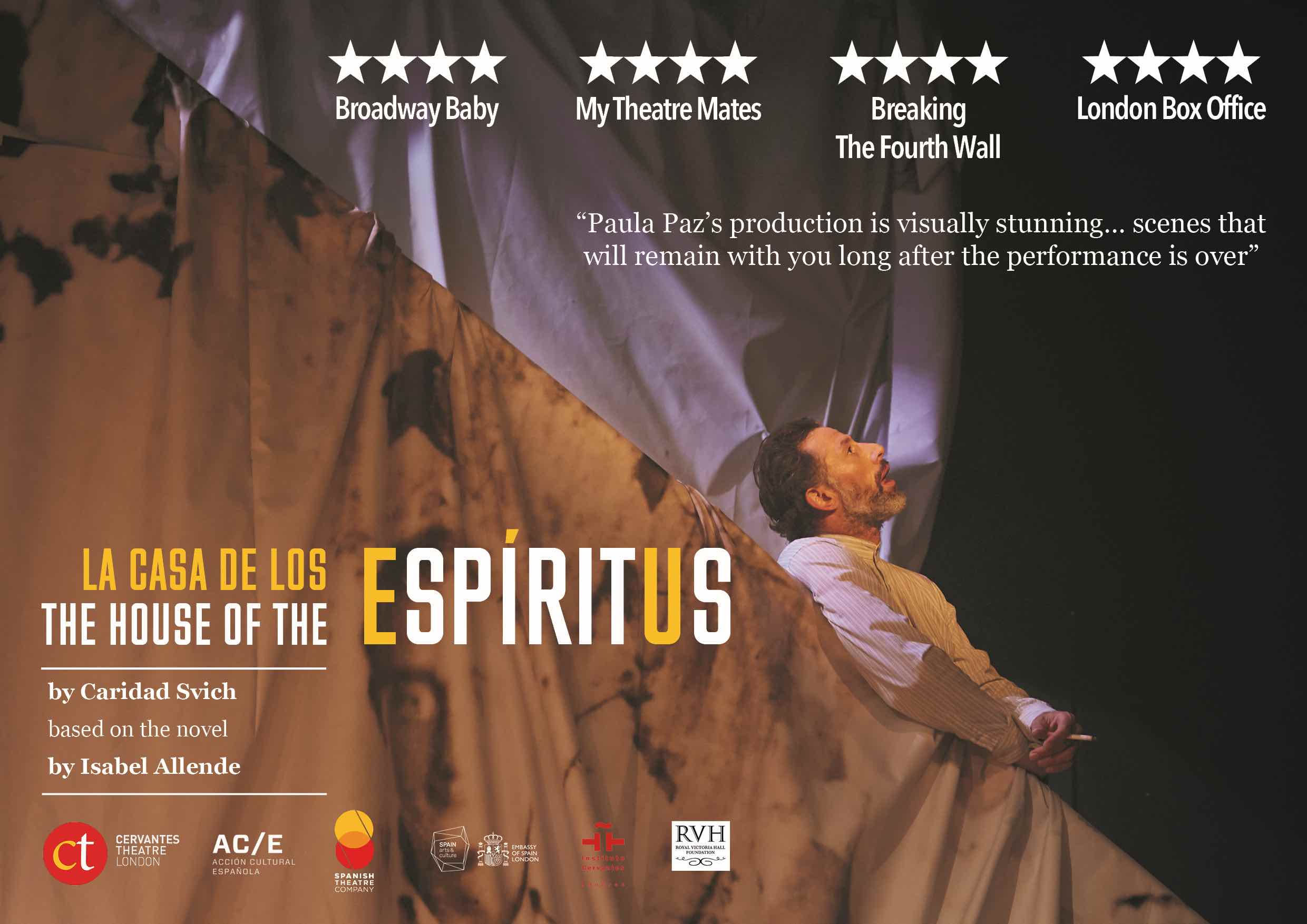
What were your beginnings in theatre? And why did you choose London?
I studied Theatre Arts in London when I was 19 years old. I intended to work with the Royal Shakespeare Company, but José Luis Gómez auditioned me for his staging of Oedipus Rex and subsequently, Jaime Chávarri arrived with his Bicycles are for the summer and so, I came back and stayed in Spain. My good friend and teacher, Jorge Eines, told me that I had a pending debt with London and here I am; I took advantage of the fact that I sent my daughter to study here when she was 15 years old and came to be closer to her. Together with Paula Paz, we created the Spanish Theatre Company and began to do Dramatised Readings in different theatres. Later, the Southwark Council put us in touch with Network Rail about a new scheme that they were planning in Union Street. The scheme threw us into the madness of building the first Spanish-speaking theatre in the history of British theatre and we did it – with very few resources! – but that’s a very long story …
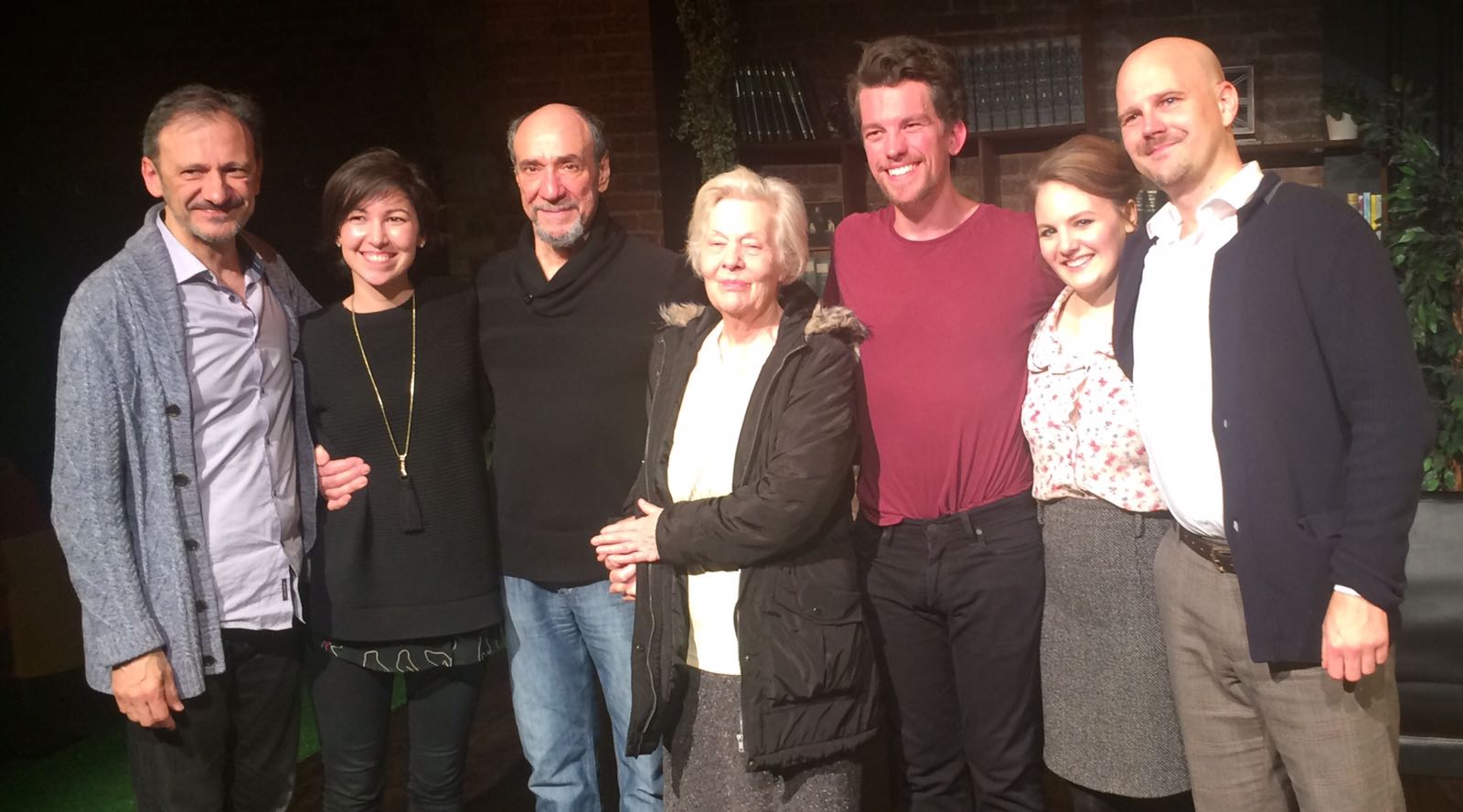
What is the most beautiful moment you remember from this journey?
The people who helped us, the faces of the audiences at the end of performances; the schools that came from Brussels on a single day return to see The House of Bernarda Alba, or even the ones who flew in from Belfast! Once, an old woman came to me in tears after seeing Yerma and told me: «I have been living in London for 27 years and to be able to live what I have lived here today with Lorca, in my language, I have no words, I am really excited, please keep it up, do not falter !”.
Students in all different professions who want to do theatre and you see that you change their lives in realtime. People who have met and related to our plays and our theatre: the huge family that we have created is beyond exciting.
How does the COVID-19 crisis affect the Cervantes Theatre?
We have closed the theatre, cancelled the tour; we have gone home and all the plans we had are frozen. Additionally, the potential Spanish aid expected for next year is now possibly delayed because of the virus and our future is very uncertain. We only have the resources to pay the theatre’s rent for two months and, after that, we may cease to exist altogether. We will do everything we can, but there is a lot of uncertainty.
Either way, I can’t stop thinking that there are many people who are going to lose their jobs. Everyone of us will undergo a radical change in our lives – we are not alone in this and we all have to join in solidarity. Only through solidarity can we withstand this brutal and unexpected blow to the very roots of our society.
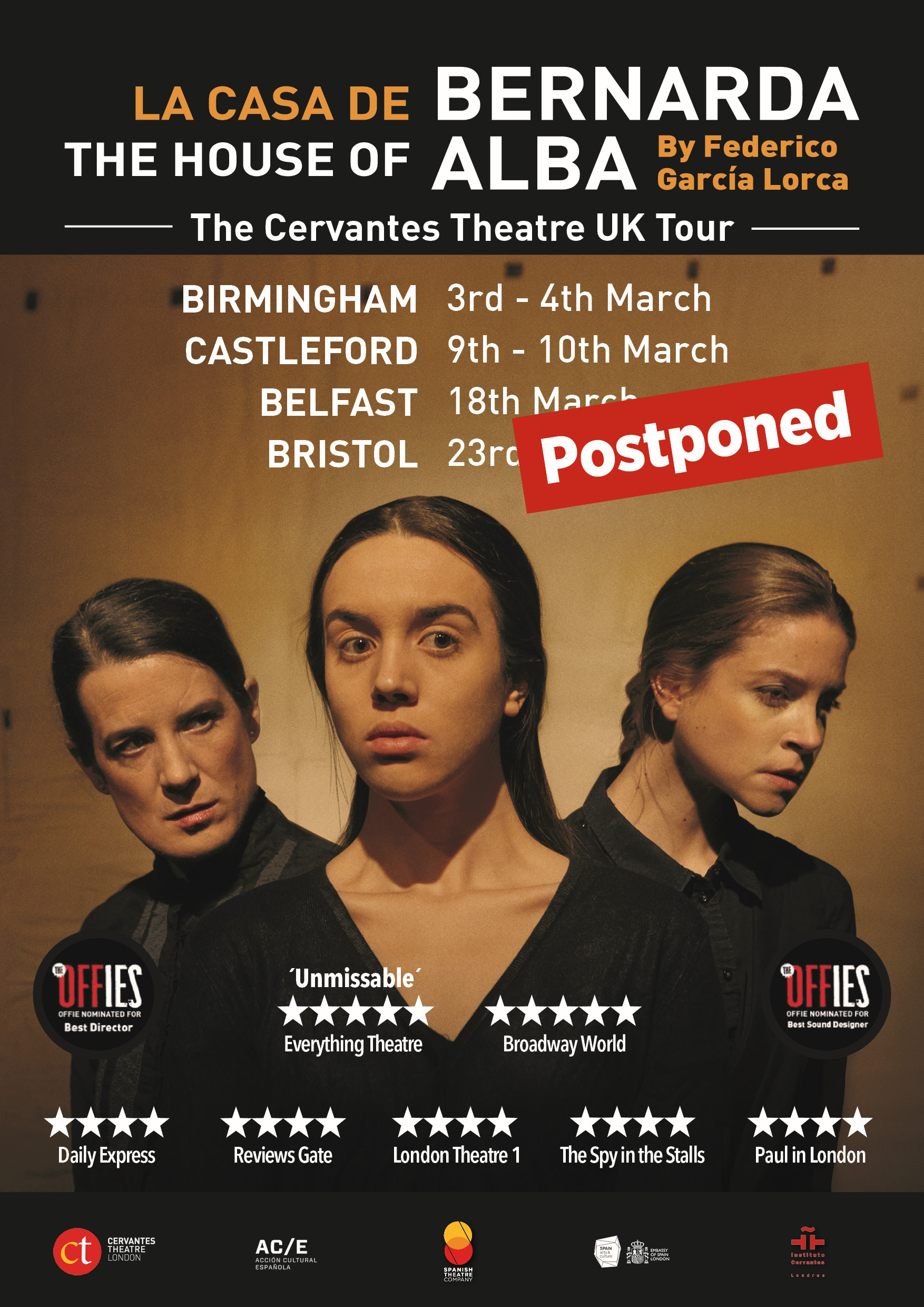
In addition, you have had to cancel the tour of La Casa de Bernarda Alba. What were you able to achieve despite the cancellation? What did you learn from the tour?
We were able to do Birmingham and Leeds tours. We were meant to proceed to Belfast and Bristol and we were also in talks with other venues to continue the tour due to the success we were having.
It was spectacular to see the theatres full of students, the Spanish community and British lovers of Spanish culture, listening to Lorca and reacting to this play in a way that surprised me.
I am left with a phrase they said in Leeds: “Thank you for coming where no one ever comes with works like this and giving us the opportunity to enjoy it; please come back!”.
Cervantes Theatre operates as a charity, what can theatre lovers do right now to help you?
Right now we are asking for as much help as possible to resist the closure. There are already some people reacting and we have received donations. Others have also registered in our Friends Scheme (Membership Scheme). I have no words to thank them but I am moved to know of our importance to people and it is for them – and for everyone who values what we do – that we continue with the strength to fight against the virus and its impact on our industry . For anyone who would like to contribute, please head to our website: www.cervantestheatre.com.
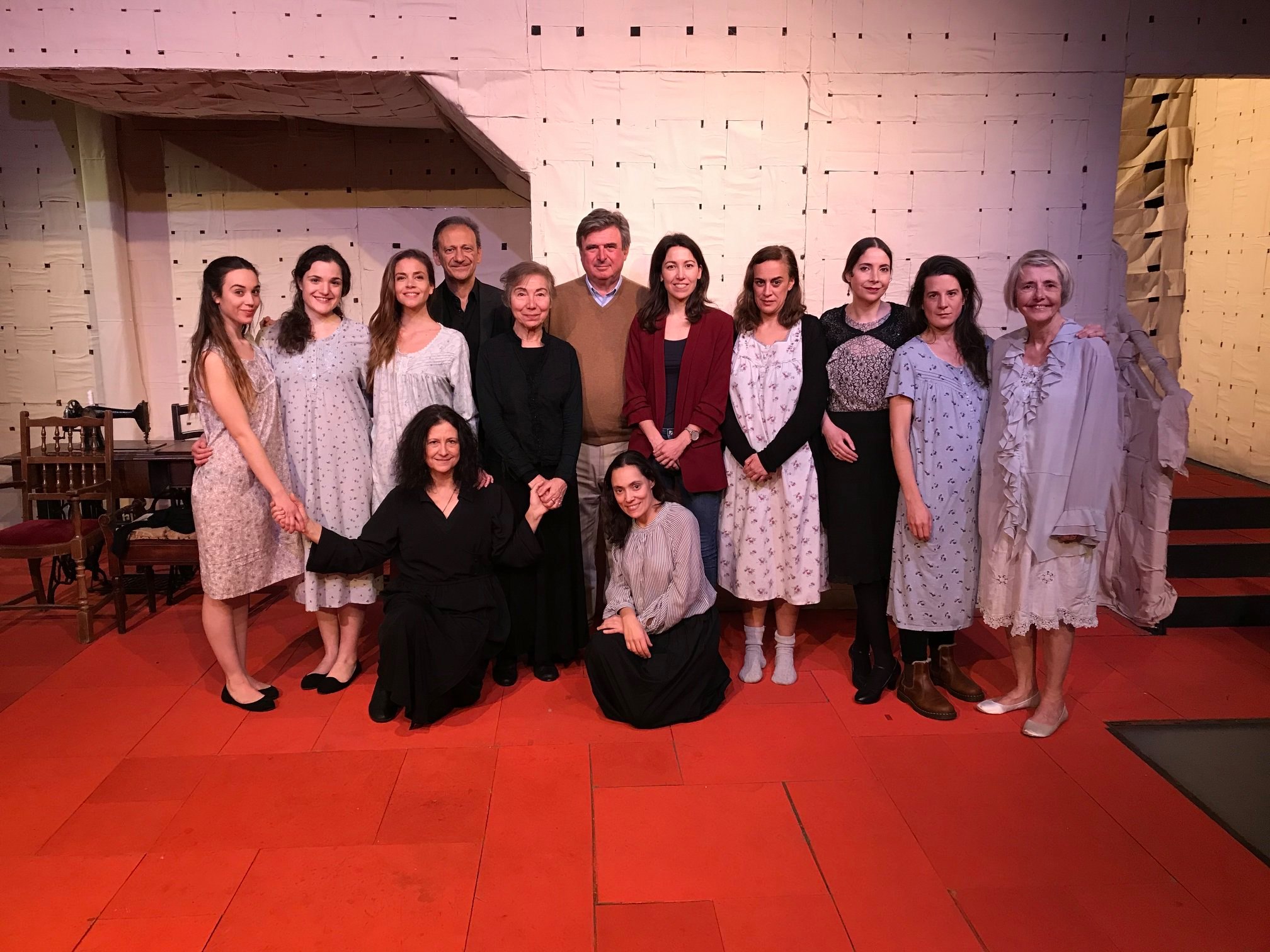
What programme do you hope to complete this year?
We had planned to dedicate the year to the «Spanish Golden Ages 1530-2020», to take a tour of Spanish creativity from the Golden Age to the present day. It was a programme that would have lasted two years (next November would have been our five year anniversary) but, as you can imagine, it’s now all in the air. We were going to continue showing theatre, poetry, music but now, honestly, I don’t know …
Why do you consider the work done by Cervantes Theatre to be so important?
I don’t think I should be the one to answer this question. But in three and a half years since we first opened, we have tripled the size of our audience. Everything was going very well and the impact we were having, despite the few resources we had, was spectacular.
Nevertheless, even when we will return to «normality», our country will face an unprecedented economic and social challenge. We will have to take very important measures internally as well as externally. With our space, in our humble way, we will continue to communicate that «normality» in a country like the United Kingdom with so many economic and cultural ties to Spain.
Culture, Industry, Tourism and Foreign Affairs should be our interlocutors when the social machinery starts up again and we want to be part of this social rebirth. This is what we hope will come and what we hope to be.
FesTeLõn, the festival of Spanish theatre in London
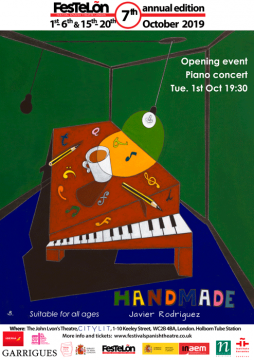
FesTeLõn, the festival that celebrates Spanish theatre in London is back for the 7th annual edition with a series of contemporary and Spanish Golden Age plays, lectures and workshops. For two weeks in October, from the 1st to 6th and 15th to 20th, the John Lyon Theatre will host a diversity of productions to submerge the audience in some of the most exciting modern and classic Spanish theatre. The premier night of each production will be followed by a Q&A session with the audience aimed at strengthening the cultural interchange and understanding between spectator and performer.
This year FesTeLõn launches its very own fringe festival, FesTeLõn-OFF. Emerging companies in the UK are invited to perform a Spanish play in a competition to be held in London next April. The winner will then perform at FesTeLõn 2020.
For the founder of the festival, Mariví Rodríguez Quiñones, the highlight of this year’s edition lies in ‘the powerful productions that give voice to women and the LGBT community to talk about power, love, violence, homophobia, struggles as relevant in their day as they are now’.
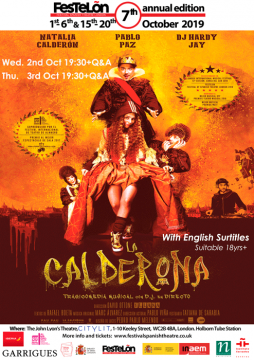
Starting with ‘La Calderona’, a black comedy musical that uses hip-hop, with a live DJ on stage, that tells the story of the most controversial of king Philip IV’s lovers. The play speaks of power, ambition, love and survival, relevant concepts in 17th century Spain that resonate very strongly with contemporary audiences.
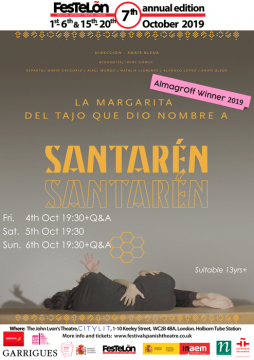
The 2019 winning production of AlmagrOff, the fringe festival that runs alongside the prestigious International Festival of Classical Theatre in Almagro, will have its UK premier at FesTeLõn. ‘La Margarita del Tajo que dio nombre a Santarén’ is a riotous and tragicomic adaptation of a religious comedy about passion, adultery, sacrilege and femicide.
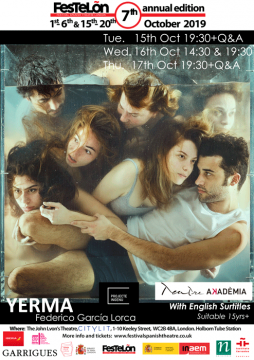
Lorca’s acclaimed play Yerma will open the second week of the festival. The portrayal of a woman’s desperate desire to become a mother reflects on the tragedy of unfulfilled expectations and the meaning of fertility in the modern day.

With only one actor on stage, Powdered Fists (Puños de Harina) presents two parallel stories of two gypsy boxers living at different moments in time but sharing similar experiences of violence, masculinity, racism and homophobia.

And last but not least, ‘Crickets and Fireflies’ (Grillos y Luciérnagas), a production about the lights and sounds of the night will instil the theatre bug in the younger audiences.
The theatre of Ramírez-Pantanella arrives in London thanks to Instituto Cervantes and Cervantes Theatre
The playwright, stage director and one of the scriptwriters of «Money Heist» Almudena Ramírez-Pantanella, will talk about her creation and will read extracts from her latest work, «Golpe de gracia», in an event that will take place on Saturday, July 20 at 4:00 pm at Cervantes Theatre in London.
«Collaborating with the Instituto Cervantes and the Cervantes Theatre is a joy and a great opportunity to publicise my work abroad. I hope that opportunities for the representation of my works can emerge here in the United Kingdom,» she explains.
Throughout her work, Ramírez-Pantanella reflects on contemporary subjects including South Korean philosopher and essayist Byung-Chul Han, the French philosopher and sociologist Jean Baudrillard and Italian writer, poet and film director Pier Paolo Pasolini.
«For us, it is important to support Spanish theatre in one of the world capitals of the theatre,» explains Ignacio Peyró, director of the Instituto Cervantes in London. «With our support of the talk and reading of Almudena Ramírez-Pantanella, we seek to show and give visibility to the talent of Spanish playwrights, as we have done in other cycles with the Cervantes Theatre and also in the cinema, with the screening of the Female Space films in the same theatre this spring «.
For her part, the associate director of the Cervantes Theatre, Paula Paz, recognizes that it is a pleasure to be able to receive Almudena again and open the doors of her theatre so she can share her experience at the residence of the Royal Court. «The Cervantes Theatre was born, among other things, with the aim of making known new Spanish dramaturgy and to serve as an international platform in London for our playwrights. This year at the Cervantes Theatre, ‘They take the floor’ and this Saturday we will be able to hear and learn first-hand the latest work of Almudena Rodríguez-Pantanella,» Paz adds.
At first, Ramírez-Pantanella explains that what interested her was the figure of the «influencer» and making a work in which, using her figures as protagonists, she could reach a young audience. For now, the theatre is where Ramírez-Pantanella feels more comfortable and where she finds more artistic freedom, since it offers her more possibilities to explore language, dialogues and images.
Ramírez-Pantanella has worked as a screenwriter in the celebrated series «Money Heist», an experience that she considers «important» in her career: «This is a series that has had worldwide success and being part of the team is a pride».
Residence at the Royal Court Theater
The playwright, who participates in a residency at the Royal Court Theater in London, gets the best out of this experience. «I have been immersed for three weeks in the English theatre, reading and watching theatre. I’m leaving with an infinite list of English authors, but also European ones, that I want to read», she emphasizes. Through meetings with different authors, directors, literary departments, development and production, the Spanish author has been able to discover some initiatives that are being carried out in the United Kingdom to support the theatre and specifically the dramatists, which she hails as, «very interesting to support public theatre.»
The playwright recognizes that she has had the good fortune to meet theatre writers she admires as Martin Crimp, and has also discovered «the inspiring personality» of the author Caryl Philipps. In addition, during the residency, she has worked with Sarah Maitland in the translation of the play ‘Golpe de Gracia’, which has given her many keys to rewriting the text, also along with Anthony Simpson Pike and Ellie Horne, who have helped her in the process of rewriting.
This summer, Ramírez-Pantanella will participate in a congress in Mérida on «Dialogues with the Greco-Latin Classics and the New Dramaturgies». In fact, she does not hide her desire that in the future he could write something for the Merida festival. In addition, in August she will finish the writing of a monologue that for now is entitled «Attacking the sun». And she is also in the pre-production phase of her first film, together with the production company Canacosmi Producciones. The film is already written, it is titled «The great machine» and they intend to start shooting it next summer.
Blood wedding
The Groom has proposed. The gifts are exchanged. The Bride longs for the wedding night. But what of the Horseman who loved her first? Lorca wrote his classic romantic tragedy in 1932, after fellow artist Salvador Dali completed his dripping watches landscape. Harsh, surreal, the play conjures cameos from the Moon and Death. The soundtrack : the percussion of the blood. A sultry night, a crescent in the sky. In the end, who will claim the Bride?
Blood Wedding by Federico Garcia Lorca, in a new version by Tanya Ronder
Directed by Lara Muth
Evenings at 7.45 p.m.
Tuesday March 16th – Saturday March 20th
Matinée at 3 p.m.
Saturday March 20th
Ticket Prices : £11 standard tickets
(£9 concessions/members)
